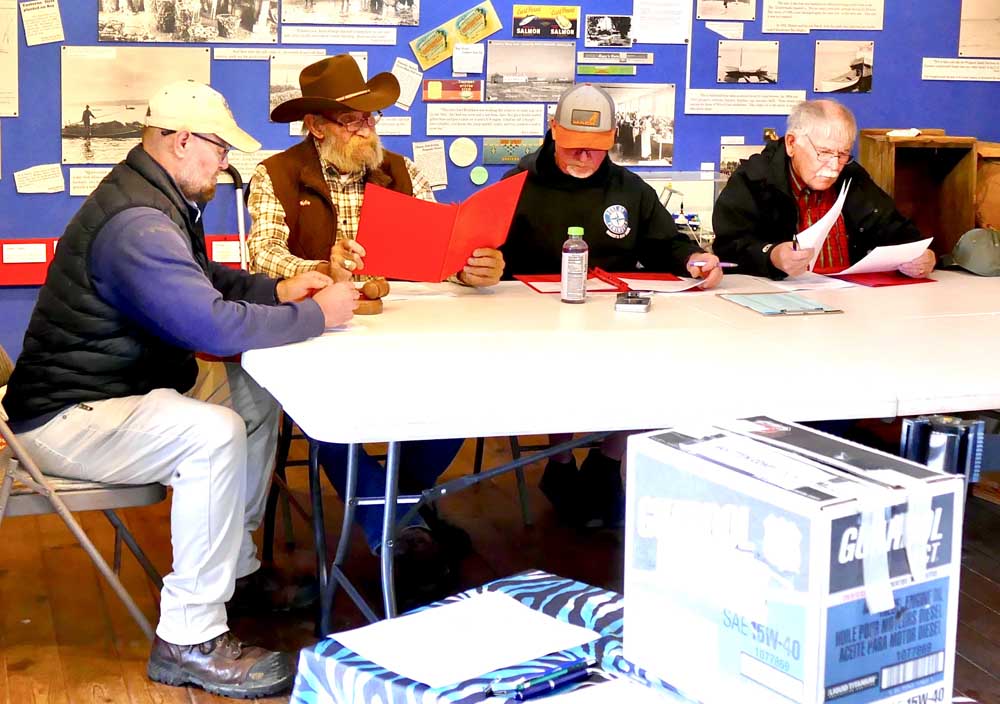Petitioners: Time for change at Port of Peninsula
Published 2:00 pm Thursday, October 31, 2024

- A taxpayer group last week petitioned the Port of Peninsula board of commissioners to have two of its members voluntarily step down following damning state audit. Pictured left to right are port manager Jay Personius, board Chair Phil Martin, Commissioner Bill Derion and Commissioner Chuck Mikkola.
NAHCOTTA — The tense situation at the Port of Peninsula continues to boil, with some residents taking an initial step toward recalling two of the port’s three commissioners. More than five dozen signed a petition and a group leading the charge continues to grow.
Trending
The port has become a near-constant headline in Pacific County. Allegations and formal findings of financial mismanagement have plagued Executive Director Jay Personius, who continues to deny any lapses.
A recent audit by the Washington State Auditor’s Office (SAO) didn’t find misappropriations, but identified four major issues demanding the port’s immediate attention, including financial record keeping. SAO will follow up with the port in 2025 to ensure compliance.
Beyond that report and alleged dysfunction, some taxpayers are actively trying to recall Port of Peninsula Commissioners Phil Martin and Bill Derion, each of whom sat on the board as problems developed and who ceded control to Personius.
Trending
Martin and Derion
Community members along the Long Beach Peninsula met Oct. 18 and concluded there was only one option — a petition to recall Martin and Derion alleging they violated their oaths of office.
Martin and Derion have been the center of ongoing tensions between the port and the community. Martin has continued to support Personius even after a plethora of issues came to light, including the recent audit by the state.
Martin and Derion are unwavering in defending the port and Personius. Derion recently posted online at the Chinook Observer that Personius has been “instrumental at saving money and getting things done” and is being chased by a “mob squad.”
“These people I refer to as a mob squad have created all of the issues which resulted in no fines, penalties, and darn near no interest at all,” Derion stated. “The comment that they are afraid of retribution and retaliation are correct but not at them. I speak from first-hand experience that they are the ones doing it.”
The port has been issued non-compliance notices for not filing employee benefits and taxes with state and federal agencies, is being sued by Pacific Seafood over financial mistrust and alleged violations of state and federal laws, spent tens of thousands on legal counsel, and was publicly scolded by the SAO.
Handing over the letter
Rising tension finally boiled over during an Oct. 22 port commission meeting, when community members handed the board a letter of no confidence (LNC), setting the stage for a formal recall.
“The commissioners were given copies of each signature sheet, but we have placed them together on one document for you all,” said Bonnie Lou Cozby, a former commissioner who is now a part of the citizen group. “We are sending the packet of letters, signatures and maps to all county commissioners, the team who worked on the audit and the state auditor, the county treasurer’s office, the mayor of Long Beach, the newspaper, and a couple more.”
‘You have refused to take the steps needed to correct past and ongoing mismanagement issues and failed to bring the Port into full compliance with federal, state, and county regulations.’
Letter of no confidence presented to the Port of Peninsula board
The three-page letter, including a signature page signed by Cozby and Ocean Park resident Ed Visser, outlines multiple reasons for the no-confidence letter, including issues outlined in the SAO report.
“You have refused to take the steps needed to correct past and ongoing mismanagement issues and failed to bring the Port into full compliance with federal, state, and county regulations.
“You have refused to act in the Port’s best interest by not immediately acknowledging and assuring the public (as a board acting as a whole body) that proper steps would be taken to address and correct the multiple findings in the recently completed SAO Accountability Audit Report (1-1-2021 to 12-31-2022).
“Your refusal to ensure compliance with all administrative and operational factors involving the Port has put tenants, customers, and the Port itself into financial jeopardy,” the letter states.
The letter alleges ongoing issues that include disregard for open meetings, not allowing public comment at commission meetings, Martin’s practice of soliciting direction from Personius, disrespecting the public, regularly voting 2-1 and cutting out Commissioner Chuck Mikkola, lack of keystone document availability, lack of monthly financial statements, lack of meeting minutes, backdating minutes, uncollected revenue, delay tactics during SAO audit, and commission salary discrepancies.
The letter also cites state law, which enables the public to recall an official for malfeasance, defined as “any wrongful conduct that affects, interrupts, or interferes with the performance of official duty,” “improper manner” or “an unlawful act and violating their oath of office to “perform faithfully a duty imposed by law.”
Along with the letter, the group acquired 56 signatures from residents within the port’s district, although Derion claimed that “no one from my district signed.” The entire meeting was captured on video and made public by the group on their Facebook page, ‘Port of Peninsula — For Real.’
“The word for today is appeasement,” Cozby said about how the meeting went. “It was an interesting meeting.”
In the dark
The news from the port’s Oct. 22 meeting wasn’t limited to the no-confidence letter. Mikkola, the commissioner who was elected last November, discovered his name is no longer shown on warrant approvals, the formal authorization for bills to be paid.
“Why is there space on the warrant approval for only two signatures, yours and yours?” Mikkola asked his two colleagues.
“Because you always vote no,” Derion replied.
Mikkola has been publicly outspoken and has regularly challenged decisions made by his colleagues and Personius. He has also, from time to time, supported decisions and cast a supporting vote of yes.
“All commissioners have a say,” Cozby said. “To drop a commissioner from the approval signature page because of past votes is not correct.”
The removal was only the tip of the iceberg for the meeting. Mikkola also clashed with his colleagues over an agenda item he sought to have added that dealt with billing.
Owing money without knowing why
Billing statements have been contentious, and are an issue raised in Pacific Seafood’s lawsuit against the port. The port stopped issuing formal billing statements at an unknown time in 2022 and resorted to handwritten receipts — an issue outlined in the SAO report that must be addressed.
According to Mikkola, he has been contacted by concerned parties who want a formal bill. Part of the discussion he was hoping to have was about being transparent with billing, which includes a breakdown of costs.
“I had hopes of generating a discussion on how to solve this problem, at least to identify the cause,” Mikkola said. “When I saw the agenda, it lacked my request, so I requested [that] the issue be added to the agenda.
“Phil denied the request, and our port manager Jay jumped out of his chair and with [a] raised voice defined the issue as not with the port, but those users not paying their bills. He challenged the complainers to bring [him] a copy of a statement that reflects that,” Mikkola added.
The topic was completely shot down, even as the port begins formulating its 2025 budget.
“Jay seems to be like my kids when growing up, saying it’s not my fault and placing the blame on everyone else,” Mikkola said. “In fact, the odd statement Jay makes on everything is ‘staff recommends’ or the ‘team recommends,’ never do I hear ‘I recommend.’ Is this a dodge if something does not work out as planned or as presented at the meeting[?] [It] must be the fault of [the] staff or team.”
Dancing to the edge
It is unusual for any public entity to move toward the new fiscal year without a preliminary budget hashed out months ahead of time. Then, final adjustments are made between the preliminary budget and the start of the fiscal year.
As for the port, with just over two months until 2025 arrives, it still doesn’t have a preliminary budget.
“In Tuesday’s meeting Jay said we need a workshop for the preliminary budget, and Jay appoints Phil as the chair to help work on the budget,” Mikkola said. “Wow, Jay must think he is king of the port and forgot he works at the pleasure of the board.”
“The board needs by vote to recommend the chair to the budget process. What troubles me is Phil has zero budget experience [except] to nod his head in approval. Bill has some scheduling experience working in construction, and I have likely the most experience in project budgeting, scheduling and cost tracking. But since I want details in a budget, not just a dollar amount, Jay is not going to ask for my help. As I’ve said repeatedly, the devil is in the details,” Mikkola said.
The port only has two scheduled public meetings remaining in 2024 since it opted to go to a one-meeting-a-month format this year. Budget workshops fall outside of the state’s Open Public Meetings Act, but public entities such as the port are required by law to hold an open public meeting at some point to solicit public comment on a proposed budget.
Thus far, the public has been banned from commenting at commission meetings except for handwritten notes placed in a drop box during meetings. What happens to those comments is unknown.









